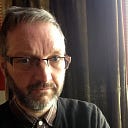‘Think of death as sacred.’
How the near-death experience of a war reporter can throw a new light on funerals. A Thought For The Day on BBC Radio 4’s Today.
In his recently published and mesmerising memoir In My Time of Dying, war reporter Sebastian Junger describes being in a hospital emergency room, after an aneurysm brings him within minutes of death.
At the same time, Junger, a convinced atheist, comes face to face with his own father — a rationalist and scientist and dead for eight years — who says he’ll take care of his son, that there’s nothing to be scared about.
This surreal episode was so vivid that, once recovered, Junger embarked on a philosophical study of other near-death experiences, the kind which seem to reach beyond explanation of medicine and science.
His brush with mortality reframes his view of life.
‘Every object is a miracle compared to nothingness,’ he writes. ‘And every moment an infinity…’
But it was an observation of a nurse, who told him he’d almost died, that struck me deeply. She counseled him not to think of death as scary.
‘Think of it,’ she said, ‘as sacred.’
The line came back to me this week with a report from Co-Op Funeralcare on how the sombre tone of the traditional funeral is being displaced by what it calls ‘celebrations of life’.
It tells of the rise of glittery caskets and mourners in football shirts and how the body in the coffin may now be joined by the mobile phone of the deceased or their snooker cue.
And of growing demand for services outside religious settings — the betting shop, the cricket pavilion, even a London bus.
Perhaps it’s no surprise that with the grip of religion broken, we are free to curate our own memorials to celebrate the person we’ve lost. A mark of our love and respect.
But if many of us no longer buy religion’s doctrinal packages or afterlife narratives, it would be a mistake to abandon what faith traditions can be good at.
And what they can be good at is the sacred. We might call it reverence or awe.
That moment of quiet in a hallowed, strange, even ancient building, where we notice how brief our days are. Ashes to ashes, dust to dust…
An orientation in music, poetry or silence that is unembarrassed by our grief… a sense of dignity that can meet our distress.
Some long-lost, half-remembered language. As one person explained to me as we organized a family funeral: ‘He wasn’t religious and we don’t want anything religiousy… can we have the Lords Prayer?’
A funeral service need not be as binary as we imagine. Religious funerals might be more inclusive of those who don’t believe and secular memorials more open to those who do.
As the nurse told the war reporter, ‘Think of death as sacred.’
